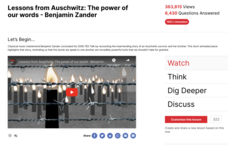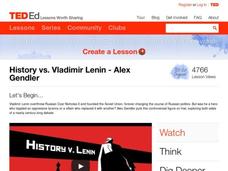TED-Ed
Getting Started as a DJ: Mixing, Mashups and Digital Turntables
What do Paris Hilton, Avicii, Diplo, and Cole Plante all have in common? They're DJs! Seventeen-year-old Plante is featured in a short video in which he demonstrates his art and encourages others who might be interested in pursuing a DJ...
TED-Ed
How Does Your Brain Respond to Pain?
Zap! Ouch! That hurts! But why? And how come people don't experience or respond to pain in the same way? Take a journey on the sensing pathway, from your nociceptors, along your nerves, up your spinal cord, to neurons and glial, through...
TED-Ed
How Languages Evolve
Do all languages have a common ancestor? Although no one yet knows the answer to that big question, the narrator of this short, animated video explains how linguists use migration patterns, geological features, and word clues to...
TED-Ed
A Brief History of Religion in Art
Did you know that some languages have no word for art? The English language does and the narrator of this short video discusses the aesthetic dimension of religious art as it "visually communicates meaning beyond language."
TED-Ed
The Silk Road: Connecting the Ancient World Through Trade
Introduce learners to The Silk Road, the first world-wide web. The narrator of this short, animated video traces the pioneers of globalization and the impact they had on culture and economy. The Scythians, Darius the First, and Alexander...
TED-Ed
What is the World Wide Web?
Did you know that the World Wide Web and the Internet are not the same thing? Did you know that Tim Berners-Lee is considered the father of the Web? Networks, web servers, web hosts, website addresses, domain names, web languages,...
TED-Ed
Lessons from Auschwitz: The Power of Our Words
Some words are best left unspoken. Words matter, according to Benjamin Zander, conductor, teacher, and lecturer. To illustrate his point, Zander recounts a story told to him by a survivor of Auschwitz. As a result of her experience this...
TED-Ed
History vs. Vladimir Lenin
Vladimir Lenin is on trial in an engaging, animated video where the merits and consequences of the formation of the Soviet Union and Lenin's actions are reviewed. This is a great way to illustrate how to establish and argue unique...
TED-Ed
Different Ways of Knowing
“Words have colors, emotions, numbers, shapes, and personalities.” Daniel Tammet welcomes viewers to his world with a 10-minutes video that illustrates how he, as an autistic savant, perceives the world. Class members are then asked to...
Howard Hughes Medical Institute
The Making of the Fittest: Evolving Switches, Evolving Bodies
How did the stickleback fish, which was once ocean bound, evolve to be able to persist in freshwater lakes? Hear from the scientists who identified the genes and related switches that allowed these survivors to adapt. In addition to the...
Khan Academy
Project: Fish Tank
Create your own exotic aquarium, well, virtual aquarium. Fill it full of various fish and sea life, add animation, color, and interactivity using JavaScript. This task utilizes your classes' knowledge of functions, parameters, and local...
Curated OER
Challenge: Tasty Tomato
Take a big bite out of the red tomato by practicing your use of the variables mouseX and mouseY in a JavaScript coding task. The activity will guide you step-by-step and will help young coders understand how to draw objects based on the...
PBS
Measuring Waves | UNC-TV Science
Discover the secrets used by scientists to measure mechanical waves. Young physicists learn about measurable wave qualities—amplitude, wavelength, and frequency—by watching and listening to a video discussing longitudinal and transverse...
Fuse School
QUIZ: Properties of Water and Dilution
What's the solution to gaining insight into your class' progress? Give this brief quiz a try! Part 10 of a 14-installment series on states of matter tests learners' skills in the areas of dilution and the properties of water, including...















